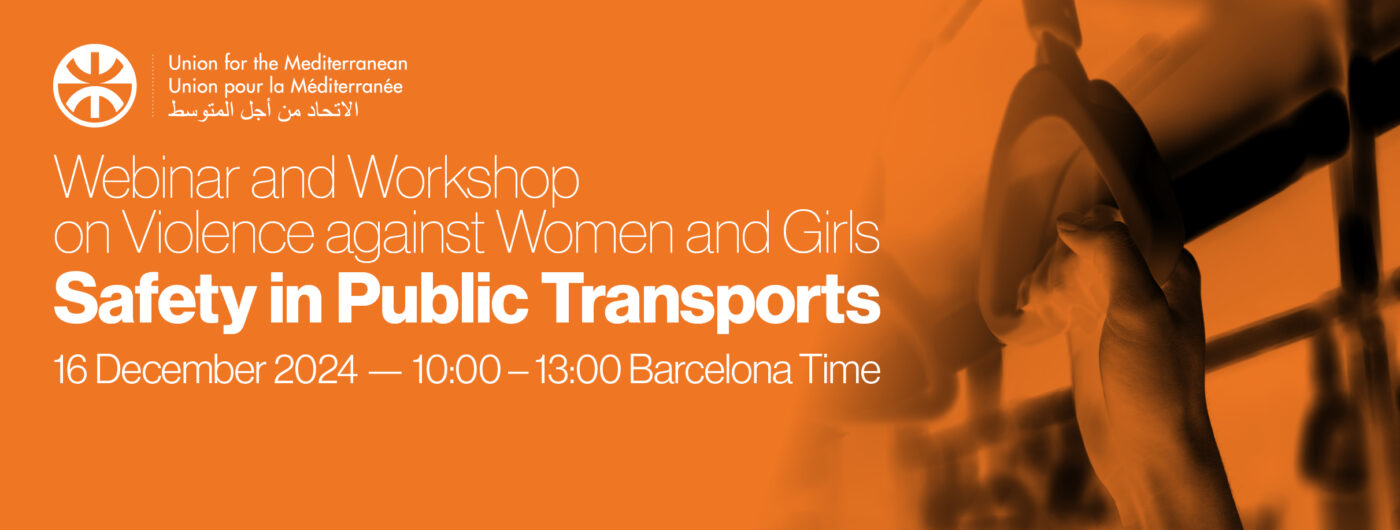
Faire progresser l’égalité des genres dans les transports : Le webinaire de l’UpM explore des solutions sensibles au genre pour des transports publics plus sûrs
16 décembre 2024, en ligne – Le webinaire et l’atelier de l’UpM consacré à la violence à l’égard des femmes et des filles, axés sur la sécurité dans les transports publics, se sont tenus en ligne le 16 décembre 2024, à la suite des 16 jours d’activisme contre la violence à l’égard des femmes et des filles organisés par les Nations Unies.
La sécurité et la sûreté des transports sont des questions intrinsèquement sensibles au genre. Le comportement des femmes en matière de transport, quel que soit le mode, est fortement influencé par les préoccupations relatives à la sécurité, lesquelles sont plus prononcées que celles des hommes. Des études révèlent que la majorité des femmes dans le monde ne se sentent pas en sécurité dans les transports publics et que nombre d’entre elles font état d’incidents de harcèlement verbal ou physique lorsqu’elles les utilisent ou se déplacent dans les espaces publics.
Dans ce contexte, le webinaire et l’atelier de l’UpM ont rassemblé des experts du monde universitaire, des médias, de la société civile et des organisations internationales pour discuter de la question sous divers angles et proposer des recommandations réalisables. Des intervenants prestigieux d’organisations internationales de premier plan, telles que l’Association internationale des transports publics, le Forum international des transports, l’Union internationale des chemins de fer et POLIS, se sont réunis pour sensibiliser aux défis et aux solutions éprouvées pour des transports publics plus sûrs pour les femmes, pour encourager la collaboration et pour intégrer les perspectives mondiales aux perspectives locales, en particulier dans les pays de la région méditerranéenne.
Les solutions proposées comprennent des améliorations ciblées des infrastructures et de leur fonctionnement, des campagnes de sensibilisation du public, une formation complète des employés, des systèmes de signalement améliorés, une approche de tolérance zéro à l’égard du harcèlement, des données ventilées par genre pour des politiques fondées sur des données probantes, des innovations technologiques et de nouveaux modèles d’entreprise.
Lors de son allocution d’ouverture dans le cadre du webinaire, la secrétaire générale adjointe par intérim de l’UpM pour les transports et le développement urbain, Amb Dhouha Najjar, a présenté les grandes lignes de l’UpM et a souligné que l’UpM s’efforçait de renforcer la collaboration intersectorielle, en particulier entre les portefeuilles des transports et de l’égalité entre les genres. Elle a rappelé le besoin urgent d’un tournant culturel et d’une action immédiate pour concevoir des systèmes de transport qui répondent aux besoins des femmes.
Le chef du secteur des transports de l’UpM, Francesc Carbonell, a noté lors de son intervention que le plan d’action régional pour les transports 2021-2027, adopté lors de la conférence ministérielle de l’UpM sur les transports en février 2023, vise à promouvoir l’autonomisation des femmes dans les transports et à garantir leur accès aux professions liées au domaine du transport et aux rôles de planification. Ce dernier a ajouté que le transport est un élément clé de plusieurs Objectifs de développement durable (ODD), en particulier l’ODD 5 sur l’égalité entre les genres, et la cible 5.2 qui met l’accent sur l’élimination de toutes les formes de violence à l’égard des femmes, y compris dans les milieux de transport.
Au cours de l’atelier, Giulia Ferraresi, analyste de projet de l’UpM pour les affaires sociales et civiles, a rappelé que 55 % des femmes dans l’UE ont été victimes de harcèlement sexuel dans les transports publics et que 65 % des femmes dans la région MENA ne se sentent pas en sécurité lorsqu’elles les utilisent. Cette dernière a ajouté que cette insécurité ne porte pas seulement atteinte aux droits fondamentaux des femmes, mais les empêche également d’accéder à des services essentiels tels que l’éducation, les soins de santé et l’emploi.
L’événement a permis de souligner le rôle central de l’UpM en fournissant une plateforme pour le partage des bonnes pratiques, en encourageant la collaboration entre les parties prenantes (villes, autorités régionales et gouvernance nationale), dans le secteur des transports publics, et en aidant à accélérer la mise en œuvre de solutions efficaces. Ce webinaire a ouvert la voie à de nouvelles activités conjointes, telles qu’un événement parallèle potentiel sur la prise en compte de la dimension de genre dans les politiques de transport durable et la prise de décision dans la région de l’UpM, dans le cadre du sommet 2025 du Forum international des transports.
